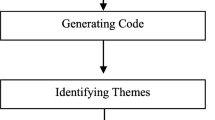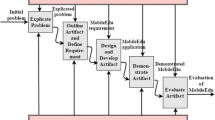Abstract
The learning customization and monitoring are considered key aspects of the teaching-learning processes. Some works have proposed mobile learning systems that provide teachers and students learning monitoring and personalization services. One of the main requirements of these kinds of systems in terms of software quality is usability; however, few works have addressed the usability issues using laboratory studies with users in real domains. In this work, we present a usability evaluation of the learning monitoring and personalization services of a mobile learning platform based on a laboratory study in which nine teachers and ten students participated. In our usability evaluation, the aspects evaluated were effectiveness, efficiency, and level of user satisfaction as proposed by the ISO/IEC 25000 family of standards. The results show that the teachers presented effectiveness, efficiency, and satisfaction considered satisfactory, while the students presented effectiveness and satisfaction classified as satisfactory and acceptable efficiency. The usability evaluation described in this work can serve as a reference for developers seeking to improve learning monitoring and personalization services development.






Similar content being viewed by others
REFERENCES
UNESCO, Personalized Learning, 2017. https://unesdoc.unesco.org/ark:/48223/pf0000250057. Accessed Nov. 21, 2021.
Hernández-Velázquez, Y., Mezura-Godoy, C., and Rosales-Morales, V.Y., M-learning and student-centered design: a systematic review of the literature, in New Perspectives in Software Engineering CIMPS 2020. Advances in Intelligent Systems and Computing, Mejia, J., Muñoz, M., Rocha, Á., and Quiñonez, Y., Eds., Cham: Springer, 2020, vol. 1297, pp. 349–363.
Abech, M., da Costa, C.A., Barbosa, J.L.V., Rigo, S.J., and da Rosa Righi, R., A model for learning objects adaptation in light of mobile and context-aware computing, Pers. Ubiquitous Comput., 2016, vol. 20, no. 2, pp. 167–184. https://doi.org/10.1007/s00779-016-0902-3
Oyelere, S.S., Suhonen, J., Wajiga, G.M., and Sutinen, E., Design, development, and evaluation of a mobile learning application for computing education, Educ. Inf. Technol., 2018, vol. 23, no. 1, pp. 467–495. https://doi.org/10.1007/s10639-017-9613-2
Benhamdi, S., Babouri, A., and Chiky, R., Personalized recommender system for e-Learning environment, Educ. Inf. Technol., 2017, vol. 22, no. 4, pp. 1455–1477. https://doi.org/10.1007/s10639-016-9504-y
**e, H., Zou, D., Zhang, R., Wang, M., and Kwan, R., Personalized word learning for university students: a profile-based method for e-learning systems, J. Comput. High. Educ., 2019, vol. 31, no. 2, pp. 273–289. https://doi.org/10.1007/s12528-019-09215-0
Cáliz, D., Gomez, J., Alamán, X., Martínez, L., Cáliz, R., and Terán, C., Evaluation of a usability testing guide for mobile applications focused on people with down syndrome (USATESTDOWN), Proc. Int. Conf. on Ubiquitous Computing and Ambient Intelligence UCAmI 2016, San Bartolomé de Tirajana, 2016.
Rani, S.S. and Krishnanunni, S., Educational App for Android-specific users-EA-ASU, in Ambient Communications and Computer Systems. Advances in Intelligent Systems and Computing, Hu, Y.C., Tiwari, S., Trivedi, M., and Mishra, K., Eds., Springer Singapore, 2020, vol. 1097, pp. 325–335. https://doi.org/10.1007/978-981-15-1518-7_27
Imran, H., Belghis-Zadeh, M., Chang Kinshuk, T.-W., and Graf, S., PLORS: a personalized learning object recommender system, Vietnam J. Comput. Sci., 2016, vol. 3, no. 1, pp. 3–13. https://doi.org/10.1007/s40595-015-0049-6
Saryar, S., Kolekar, S.V., Pai, R.M., and Pai, M.M., Mobile learning recommender system based on learning styles, in Soft Computing and Signal Processing. Advances in Intelligent Systems and Computing, Wang, J., Reddy, G., Prasad, V., and Reddy, V., Eds., Springer Singapore, 2019, vol. 900, pp. 299–312. https://doi.org/10.1007/978-981-13-3600-3_29
Meenakshi, K., Sunder, R., Kumar, A., and Sharma, N., An intelligent smart tutor system based on emotion analysis and recommendation engine, Proc. Int. Conf. on IoT and Application (ICIOT), Honolulu, 2017, pp. 1–4. https://doi.org/10.1109/iciota.2017.8073608.
Martinez, L.G., Marrufo, S., Licea, G., Reyes-Juárez, J., and Aguilar, L., Using a mobile platform for teaching and learning object oriented programming, IEEE Lat. Am. Trans., 2018, vol. 16, no. 6, pp. 1825–1830. https://doi.org/10.1109/TLA.2018.8444405
Oyelere, S.S., Suhonen, J., Wajiga, G.M., and Sutinen, E., Design, development, and evaluation of a mobile learning application for computing education, Educ. Inf. Technol., 2018, vol. 23, no. 1, pp. 467–495. https://doi.org/10.1007/s10639-017-9613-2
Sharma, A., A proposed e-learning system facilitating recommendation using content tagging and student learning styles, in Proc. 5th Nat. Conf. on E-Learning & E-Learning Technologies (ELELTECH), Hyderabad, 2017, pp. 1–6. https://doi.org/10.1109/eleltech.2017.8074989.
Tortorella, R.A.W. and Graf, S., Considering learning styles and context-awareness for mobile adaptive learning, Educ. Inf. Technol., 2017, vol. 22, no. 1, pp. 297–315. https://doi.org/10.1007/s10639-015-9445-x
Jagušt, J. and Botički, I., Mobile learning system for enabling collaborative and adaptive pedagogies with modular digital learning contents, J. Comput. Educ., 2019, vol. 6, pp. 335–362. https://doi.org/10.1007/s40692-019-00139-3
Yao, C.B., Constructing a user-friendly and smart ubiquitous personalized learning environment by using a context-aware mechanism, IEEE Trans. Learn. Technol., 2017, vol. 10, no. 1, pp. 104–114. https://doi.org/10.1109/tlt.2015.2487977
Huerta-Guerrero, C., et al., Kaanbal: a mobile learning platform focused on monitoring and customization of learning, Int. J. Emerging Technol. Learn., 2020, vol. 16, no. 1, pp. 18–43.
ISO/IEC 25010:2011: Systems and Software Engineering – Systems and Software Quality Requirements and Evaluation (SQuaRE) — System and Software Quality Models, 2011. https://www.iso.org/obp/ui#iso:std:iso-iec:25010:ed-1:v1:en.
ISO/IEC 25022:2016: Systems and Software Engineering – Systems and Software Quality Requirements and Evaluation (SQuaRE) — Measurement of Quality in Use, 2016. https://www.iso.org/obp/ui#iso:std:iso-iec:25022:ed-1:v1:en.
Arain, A.A., Hussain, Z., Rizvi, W.H., and Vighio, M.S., Evaluating usability of M-learning application in the context of higher education institute, Proc. Int. Conf. on Learning and Collaboration Technologies, Toronto, 2016.
Kumar, B.A. and Mohite, P., Usability study of mobile learning application in higher education context: an example from Fiji National University, in Mobile Learning in Higher Education in the Asia-Pacific Region, Springer, 2017, pp. 607–622.
Pensabe-Rodriguez, A., Lopez-Dominguez, E., Hernandez-Velazquez, Y., Dominguez-Isidro, S., and De-la-Calleja, J., Context-aware mobile learning system: usability assessment based on a field study, Telematics Inf., 2020, vol. 48, p. 101346. https://doi.org/10.1016/j.tele.2020.101346
Hariyanto, D., Triyono, M.B., and Köhler, T., Usability evaluation of personalized adaptive e-learning system using USE questionnaire, Knowl. Manag. E-Learning, 2020, vol. 12, no. 1, pp. 85–105. https://doi.org/10.34105/j.kmel.2020.12.005
Kumar, B.A. and Mohite, P., Usability guideline for mobile learning apps: an empirical study, Int. J. Mob. Learn. Organ., 2016, vol. 10, no. 4, pp. 223–237.
Yağmur, S. and Çakır, M.P., Usability evaluation of a dynamic geometry software mobile interface through eye tracking, Proc. LCT 2016: Learning and Collaboration Technologies, Toronto, 2016, pp. 391–402. https://doi.org/10.1007/978-3-319-39483-1_36.
Asghar, M., Bajwa, I.S., Ramzan, S., Afreen, H., and Abdullah, S., A genetic algorithm-based support vector machine approach for intelligent usability assessment of m-learning applications, Mobile Inf. Syst., 2022, vol. 2022, 1609757. https://doi.org/10.1155/2022/1609757
Kumar, B.A. and Mohite, P., Usability of mobile learning applications: a systematic literature review, J. Comput. Educ., 2018, vol. 5, no. 3, pp. 1–17. https://doi.org/10.1007/s40692-017-0093-6
Tullis, T.S. and Stetson, J.N., A comparison of questionnaires for assessing website usability, Proc. Usability Prof. Assoc. Conf., Minneapolis, 2004, pp. 1–12.
Jacob, N., 10 usability heuristics for user interface design, in Usability Heuristics for User Interface Design. https://www.nngroup.com/articles/ten-usability-heuristics/.
Alonso, C.M., Domingo, D.J., and Honey, P., Los estilos de aprendizaje, in Procedimientos de diagnostico y mejora, Bilbao: Editorial Mensajero, 2007.
Chin, K.L., Diehl, J.P., and Norman, V.A., Questionnaire for user interface satisfaction, Proc. ACM CHI’88 Development of an Instrument Measuring User Satisfaction of the Human-Computer Interface, Washington, 1988, pp. 213–218.
ISO Iso/Np 9241-11: Ergonomics of Human-System Interaction – Part 11: Usability: Definitions and Concepts, 2018. https://www.iso.org/obp/ui/#iso:std:iso:9241:-11:ed-2:v1:en. Accessed June 23, 2022.
Chujkova, E.N., Aidinyan, A.R., and Tsvetkova, O.L., Adaptation algorithm for application menus, Program. Comput. Software, 2020, vol. 46, pp. 397–405.
Author information
Authors and Affiliations
Corresponding authors
Rights and permissions
About this article
Cite this article
Del-Ángel-Flores, H., López-Domínguez, E., Hernández-Velázquez, Y. et al. Usability Evaluation of a Mobile Learning Platform Focused on Learning Monitoring and Customization based on a Laboratory Study. Program Comput Soft 48, 583–597 (2022). https://doi.org/10.1134/S0361768822080102
Received:
Revised:
Accepted:
Published:
Issue Date:
DOI: https://doi.org/10.1134/S0361768822080102




